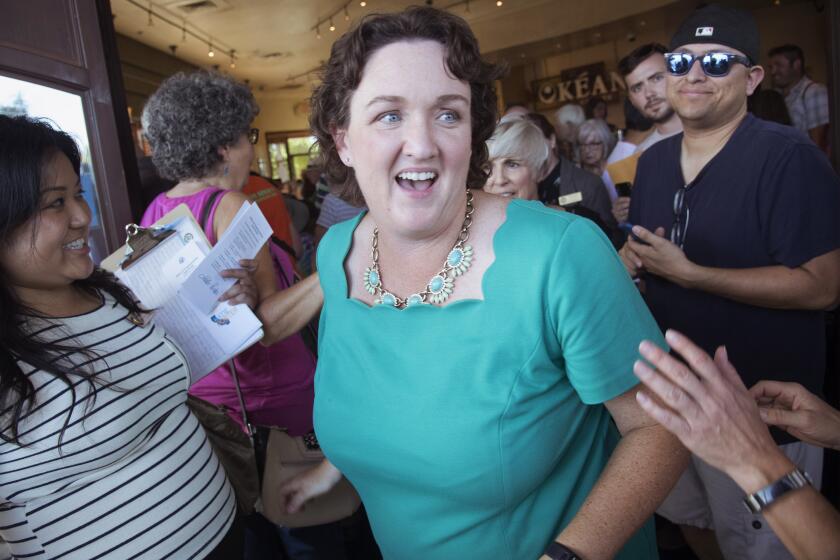Military Sees Dangers in North’s Actions
- Share via
When Marine Lt. Col. Oliver L. North emerged as a national hero after his first week of testimony on Capitol Hill, it proved only one thing: Ask the wrong questions, and you get the wrong answers.
It was also obvious that the congressional committees’ high-priced lawyers, steeped in the amoral traditions of the American legal profession, have an educated incapacity to ask the right questions. They obviously know nothing of the American military or the principles of duty, integrity and loyalty that are central to it. As a result, North was able to portray himself as the very embodiment of a patriotic American Marine.
It might have been a different story if those asking the questions had known what they were talking about. Consider, for example, what might have transpired if North’s interrogator had been a Marine gunnery sergeant who had survived the bombing of the Marine barracks at the Beirut airport in 1984. “Col. North,” he might have asked, “as you know, a military officer’s loyalty is not only to his superiors, it is also to his contemporaries and especially to his subordinates, who look to him to stand up for their interests. That being the case, how could you consider selling arms to the very Iranians who paid $1 million to the Lebanese terrorists who killed more than 200 of my buddies--and your fellow Marines--in the bombing of our barracks in Beirut?”
Or consider if his questioner had been a tank platoon leader from the Army’s 24th Infantry Division at Ft. Stewart, Ga., whose mission it is to intervene in Iran if American interests there are threatened: “Can you tell me how I explain to the young soldiers in my platoon that if we have to go into battle in Iran they might well be killed by the TOW anti-tank missiles that you sent to the Iranians?”
Perhaps the congressional committee could have brought in a contra guerrilla fighter: “Senor North, I want first to thank you for your efforts to get supplies to us while U.S. aid was cut off. But there is one thing that I don’t understand. Believing in democracy, I fought with the Sandinistas against the Somoza military dictatorship. And when they, too, imposed a military dictatorship under Commandante Ortega, I again took to the hills to fight for the principles of democracy. But now I find that you, too, have betrayed democracy in the name of fighting for democracy. If we abandon our principles, how then do we differ from our enemies who insist that the ends justify the means?”
The committee could have sent down the road to Quantico, Va., and got one of the students from the Marine Command and Staff College to ask the questions: “You said that you would stand on your head in the corner if the President told you to. But such blind obedience to orders flies in the face of what we’re being taught at Quantico. As you are well aware, in the American military tradition ‘just obeying orders’ has never been an excuse for an illegal action. While a private may not know better--and even that is not an excuse--an officer has a duty to refuse an illegal order. Where then would you draw the line? With shooting prisoners? With violating other laws of war? Or subverting the Constitution that you took a solemn oath to defend?”
That last question strikes at the heart of the matter. One of the main tenets of American democracy has been the subordination of the military to civilian control, so the current canonization of Lt. Col. North can have dangerous consequences.
The framers of the Constitution, 23 of whom had served as soldiers in the Revoutionary War, wrote specific safeguards into the Constitution. The American military would be an instrument of the American people rather than of the President. Congress--its members the elected representatives of the people--was given exclusive power to raise the military, commit it to war and make rules for its governance.
While the President was named commander in chief and had operational command of the military, an officer’s oath of office was pledged to the Constitution. Thus an officer’s loyalty was not only to the President, it was also to Congress. Military officers are legally bound to obey the laws enacted by that Congress; they are honor-bound by their oath as well.
Abandoning that tradition in the name of expediency can spell disaster. Now the right of the political spectrum applauds North’s stance in the name of the “higher principle” of anti-communism in Central America. But a decade or so ago it was the left of the spectrum that was calling on the military to disregard the orders of its civilian superiors and refuse to serve in Vietnam.
Tampering with civilian control of the military by the President or Congress is a slippery slope indeed, for at the bottom of that slope is military dictatorship.
Wittingly or not, tampering with those controls is precisely what North was doing. Ironically, the military sees the dangers in his actions more clearly than do many civilians. North may be a national hero to many Americans, but he assuredly is not to most of his fellow military officers.
More to Read
Get the L.A. Times Politics newsletter
Deeply reported insights into legislation, politics and policy from Sacramento, Washington and beyond. In your inbox twice per week.
You may occasionally receive promotional content from the Los Angeles Times.










